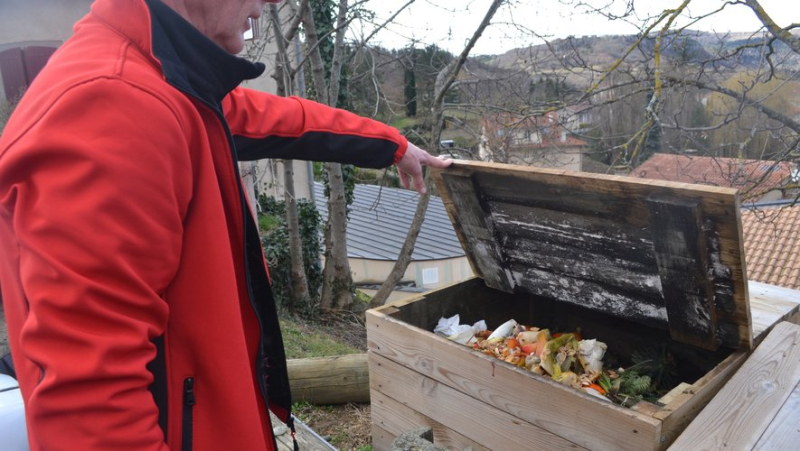Sorting of bio-waste: “The law is going in the right direction but it could have been more restrictive”

Composting your food scraps, a useful gesture for the planet. Midi Libre – JULIEN CHAILLOU
Since January 1, 2024, in accordance with European law and the anti-waste law of 2020, the sorting of bio-waste must be generalized and concern all professionals and individuals. A small revolution which has gone under the radar of the news at the end of the year. Are we ready ? The point of view of Augustin Nicoulin, co-manager of Scop Compostons (Montpellier), which offers advice and engineering to companies, communities and individuals on the subject.

Augustin Nicoulin, co-manager of Scop Compostons in Montpellier. DR
Your cooperative has been offering advice on the good management of bio-waste since 2017. Is the law that came into force on January 1st going in the right direction in your opinion ?
That’s the right term. Not only is it going in the right direction, but it is also common sense. Bio-waste today represents between 30% and 40% of gray trash. If we manage to manage them on site with composting, there is even less waste to transport, therefore a reduction in the movements of garbage trucks which consume up to 68 liters of gasoline per 100 km. This is not insignificant at a time when global warming is the second concern of the French. The creation of compost is also the return of organic matter to the earth to breathe new life into dry soil. There are only advantages. We can, however, regret that this law is not courageous enough, to the extent that it is not accompanied by constraints for communities. Let's say that it has the advantage of democratizing the subject and showing the right direction.
Is there still an awareness ?
In 2017, when we created our Scop, we had the impression of preaching in the desert. Today, each community has a composting service, but most are not yet sufficiently provided with human, technical and financial resources. In the Montpellier Metropolis, for example, we produce 40,000 tonnes of food waste and there are only 50 shared composting sites, when ideally there should be 8,000. We are obviously aware that this is not the case. is not possible, particularly in the city of Montpellier where installing composters would require a lot of public space. It is therefore necessary to combine the collection of bio-waste with composting. But I remain positive, it is going in the right direction, we are intervening in schools, neighborhoods, in the Montpellier Metropolis, the Pays de l’Or, Nîmes Métropole, there are timetables for deploying composters. . But we need to step up the accelerator again.
And how to release the brakes ?
We need citizen demand for elected officials and courageous elected officials and this requires awareness. When we explain, for example, that food scraps are moved to be burned, there is often awareness. But today, information is an item that represents on average only 1% of the waste budget. If we went up 5 to 10%, that would allow a real paradigm shift, like in the past with glass sorting which is now a reflex, and communities would quickly see a return on investment. In individual homes for example, it is not only necessary to distribute a composter, it is also necessary to explain how to use it properly, to inform that we can also use garden waste which also represents a significant cost for the community. community. In private residences, you have to rely on volunteers, so go there to convince. The demand exists. In Montpellier, where we are identifying needs, there are currently ten projects awaiting a collective composter.
Paying for waste by weight produced by each household could be a solution ?
Touching the wallet is an incentive. Today, whether we sort our bio-waste or not, we pay for the management of all the others, a tax drowned in the property tax. In the areas where this system has been implemented, composting has actually exploded. The problem remains that waste management is not a very politically relevant subject and is therefore not often the priority of elected officials.
What exists in the region
Regional communities are not starting from scratch in sorting bio-waste, but many are still in the process of sorting bio-waste. initiate the movement. Non-exhaustive overview.
In the Montpellier metropolis, while door-to-door collection of bio-waste has been on the rise for some time. privileged, the choice fell to towards the construction of a local network of voluntary contribution points. Since June, ten municipalities in the region have been testing this system with a deployment schedule until 2025. This year, 170 contribution points will complete the 80 existing.
Nîmes Métropole has launched in 2022 a "100% composting territory" with the creation of shared sites and the installation, territory by territory, of free composters and worm composters. A new step has been taken. launched at the end of 2023 in the municipalities of Leins Gardonnenque, the deployment should last until 2026.
Béziers Méditerraneanée has initiatedé in 2023 a door-to-door collection system in 10,000 homes equipped with orange bins and plans, & Ultimately, the creation of a methanization plant to recover bio-waste, while extending collection to other households.
The Agglomeration of Gard Rhodanien, which formalizes its incentive fee, has supported its development. its policy of deploying 57 collective composting areas, including 8 to Bagnols-sur-Cèze, and the sale à 20 € of individual composters.
Alès Agglomération purchasedé 20,000 composters who have started &agrav; to be distributed and launched an experience of urban collective composters.
I subscribe to read more




